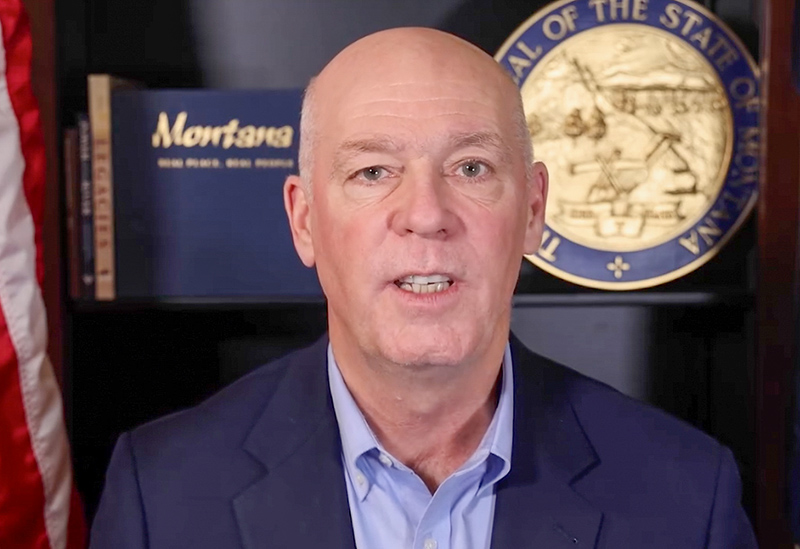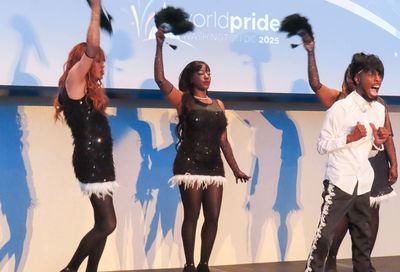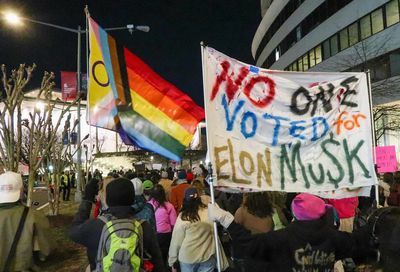Ron DeSantis Signs Anti-LGBTQ “Slate of Hate” into Law
Florida governor approves book ban, health care ban for trans youth, trans restroom ban, and restrictions on drag performances.

Florida Gov. Ron DeSantis signed a slew of anti-LGBTQ legislation into law.
These include:
- An expansion of the “Don’t Say Gay” law, complete with a new process to get books pulled from school library shelves.
- An anti-transgender bathroom ban.
- A ban on gender-affirming health care for minors.
- A bill aimed at preventing drag performances in public.
The four bills, which activists dubbed the “Slate of Hate,” continue a Republican-led political strategy of passing greater restrictions on LGBTQ individuals by exploiting societal discomfort with diverse sexual orientations and the idea of gender-nonconformity for political gain.
According to the Human Rights Campaign, more than 500 bills restricting LGBTQ people’s visibility, civil rights, or ability to access single-sex facilities have been introduced nationwide, with at least 48 becoming law.
DeSantis and his fellow Republicans, as they have with all legislation addressing LGBTQ issues, have cast the new laws as necessary to protect children from becoming “indoctrinated” into identifying as LGBTQ.
In a press conference ahead of the bill signing, DeSantis particularly emphasized the ban on gender-affirming care, asserting that prohibiting surgical and hormonal interventions would prevent “mutilation” of minors and help youth avoid irreversible medical procedures that they may grow to regret.
But the new law also goes further, requiring doctors to obtain written consent from adult patients using a form — which has been adopted by the Florida Board of Medicine and the Florida Board of Osteopathic Medicine — that essentially seeks to discourage adult patients from following through on gender-affirming treatments by portraying them as dangerous and experimental.
The law also prohibits adults on Medicaid from obtaining coverage for any transition-related treatments. It potentially restricts care for adults by requiring those undergoing gender-affirming care to meet in person with medical providers, who must warn them about potential consequences before prescribing medication or recommending surgical interventions.
In addition, the new law inserts the state into internal family disputes by granting Florida courts jurisdiction in child custody battles involving transgender children when a parent who lives in Florida opposes allowing a child to access gender-affirming care, even if the parent living out of state has given permission for the child to receive such treatments, according to Reuters.
The World Professional Association for Transgender Health (WPATH), which makes recommendations for medical providers on what types of transition-related care patients should receive and when, criticized the state for interfering in the doctor-patient relationship.
“Florida’s bill has created a chilling effect on the medical community by inserting politics into health care. This ban threatens health care providers with criminal penalties simply for doing their jobs, and will make it even harder for transgender and gender diverse people to obtain essential health care,” Marci Bowers, the association’s president, said in a statement.
The other bills signed by DeSantis are also expected to have a significant impact.
Under the bill expanding the state’s existing “Don’t Say Gay” law, any discussions of sexual orientation or gender identity are prohibited from pre-kindergarten through eighth grade, and allows them only in a limited context, such as a health, sex education, or biology class, at the high school level.
That bill also allows any resident of a school district — regardless of whether they have children enrolled in school — to demand the removal of books they deem objectionable from school library shelves.
Under the bathroom bill, transgender students will be required to use only those restroom and changing facilities matching their gender identity.
And under the anti-drag law, businesses that host drag shows — now characterized as “adult live performances” — can be fined thousands of dollars and potentially have their business license or liquor license suspended or revoked if minors are believed to have been on the premises, regardless of whether they were actually present at the time of such a performance.
The emphasis on LGBTQ issues, especially those involving transgender youth, comes just as DeSantis is expected to launch a bid for the 2024 Republican presidential nomination, seeking to court not only social conservatives but Republican base voters opposed to political correctness, enforced diversity and inclusion initiatives, and so-called “woke” ideology, an amorphous term generally referring to instances in which people are aware of, or concerned with, issues dealing with social justice, inequity, and systemic discrimination.
Jen Cousins, a parent of four public school-age students from Orlando, and the co-founder of the Florida Freedom to Read Project, warned of the consequences of expanding the “Don’t Say Gay” law and book censorship practices during a virtual press conference hosted by the LGBTQ rights organization Equality Florida.
“What we’re seeing is an even further attack on our LGBTQ+ students and our educators,” she said, accusing Florida politicians of having gaslit their constituents when they claimed that the law was narrowly tailored and not about censoring any mention of LGBTQ identity.
“The things that they assured us of last year when they passed [‘Don’t Say Gay’] and said, ‘No, no, no, it’s not about that,’ they proved today, that is what it is all about,” Cousins said.
“This bill is now going to allow a person in any district, whether or not they have children, to challenge books that are in the school district. And if they challenge it on the basis on sexual content, the book must now be removed from the district within five days. We’re looking at over 1,000 book titles that have been challenged just within the past year alone in Florida. This is going to guarantee double the number of challenges, at the very least.”
“We know that the main targets of these challenges are books that are either written by LGBTQ authors or feature LGBTQ+ themes. They also go after books about people of color, about African-American history, and even books about the Holocaust, and this bill is just going to empower them to go even further,” Cousins continued.
“It does not protect parental rights of everybody. My parental rights are being violated by laws like this, because it’s going to allow people who are not accepting of families like mine — where I have two queer children — to dictate what my children are learning in school. Their parental rights stop where mine begin, but that is not what this law allows them to do.”
“This is not about protecting children. This is about promoting a political agenda,” Jennifer Solomon, the chapter president of the pro-LGBTQ organization PFLAG South Miami, said of the slate of anti-LGBTQ legislation.
“This is extremely scary. We have families that are leaving the state because they cannot properly parent their child. Whether it’s in the school system, in the medical community, we are not allowing parents to make simple choices for their children. As parents in this state, we are not being respected, and our children are not being respected.”
Angelique Young, a transgender activist and drag entertainer from the Tampa area, who was one of the lead organizers of the Drag March on the State Capitol in Tallahassee earlier this year, said that the law attempting to restrict drag performances is so overly broad that it could carry potentially far-reaching consequences for mainstream heterosexual entertainers that have content that some might deem “sexual” in their acts.
“We’re not out here trying to change anybody’s child. We’re not trying to show them that this is the life they should live,” she said of arguments bill proponents have made alleging that drag performers seek to indoctrinate children. “The reality is that, as a trans woman, I have known I was a woman my whole life. … I knew that when drag came about, it was an art form for me. It was something that changed my life because it gave me the ability to perform and entertain as a trained dancer.
“My art form is not endangering to children, it’s not endangering to anyone. It’s a beautiful thing. I do acrobatics, like you would see at a circus or at the Olympics with a gymnast. My level of training is that high. And I share it with the community on an affordable level. I even do it for free at Pride events,” Young added.
“What this bill does is take away the opportunity for trained people like myself to showcase their talent, their skills, and education in a mindful way. … I’m more than just drag. Drag is just a medium I use. … To minimize us, to [categorize] us as ‘lewd and lascivious acts,’ as if all we do is walk around in bathing suits or without clothing, you are truly spreading misinformation through the roof.”
The LGBTQ legal advocacy organization Lambda Legal blasted the newly signed laws.
“By signing these four anti-LGBTQ+ bills into law — on International Day Against Homophobia, Biphobia, and Transphobia no less — Governor Ron DeSantis is demonstrating an intentional, callous disregard for LGBTQ+ Floridians and, in particular, trans youth by facilitating homophobia and transphobia and exposing this most vulnerable population to discrimination, harassment, and abuse,” Kristine Kippins, the deputy legal director for policy at Lambda Legal, said in a statement.
“This heinous and horrific move is but the latest step in a sweeping campaign of hate and discrimination by the DeSantis administration against LGBTQ+ people for crass political gain,” Kippins added. “Let’s be clear, these laws will deny transgender people access to health care, will criminalize and put LGBTQ+ lives in danger, will suppress or cancel LGBTQ+ events such as Pride parades and festivals, will censor LGBTQ+ content in schools, and will invite violence and abuse across the state. By signing these bills on this day, Gov. DeSantis is enshrining his hateful motives into law at the cost of the needs, lives, and futures of Florida’s children.”
Support Metro Weekly’s Journalism
These are challenging times for news organizations. And yet it’s crucial we stay active and provide vital resources and information to both our local readers and the world. So won’t you please take a moment and consider supporting Metro Weekly with a membership? For as little as $5 a month, you can help ensure Metro Weekly magazine and MetroWeekly.com remain free, viable resources as we provide the best, most diverse, culturally-resonant LGBTQ coverage in both the D.C. region and around the world. Memberships come with exclusive perks and discounts, your own personal digital delivery of each week’s magazine (and an archive), access to our Member's Lounge when it launches this fall, and exclusive members-only items like Metro Weekly Membership Mugs and Tote Bags! Check out all our membership levels here and please join us today!
























You must be logged in to post a comment.